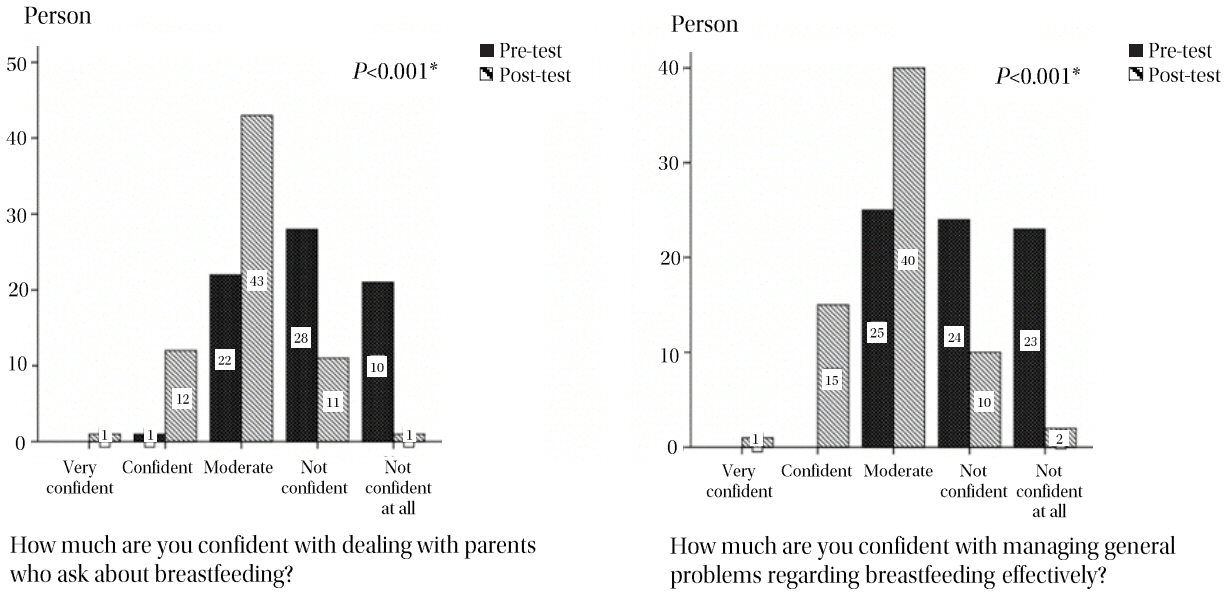Neonatal Med.
2022 Feb;29(1):28-35. 10.5385/nm.2022.29.1.28.
A Multi-Center Educational Research Regarding Breastfeeding for Pediatrics Residents in Korea
- Affiliations
-
- 1Department of Pediatrics, Kyung Hee University Hospital, Seoul, Korea
- 2Department of Pediatrics, Kyung Hee University Hospital at Gangdong, Seoul, Korea
- 3Department of Pediatrics, Kangwon National University Hospital, Chuncheon, Korea
- 4Department of Pediatrics, Korea University Anam Hospital, Seoul, Korea
- 5Department of Pediatrics, Asan Medical Center, University of Ulsan College of Medicine, Seoul, Korea
- 6Department of Pediatrics, Soonchunhyang University Seoul Hospital, Seoul, Korea
- 7Department of Pediatrics, Nowon Eulji Medical Center, Eulji University, Seoul, Korea
- 8Department of Pediatrics, Hanyang University Seoul Hospital, Seoul, Korea
- 9Department of Pediatrics, Inje University Busan Paik Hospital, Busan, Korea
- KMID: 2527258
- DOI: http://doi.org/10.5385/nm.2022.29.1.28
Abstract
- Purpose
Pediatricians have a significant responsibility to educate mothers about the importance of breastfeeding. However, there have been minimal efforts in the courses of resident training in Korea. The purpose of this study is to evaluate the change in knowledge and attitude before and after a 4-week breastfeeding educational intervention among multicenter residents.
Methods
Prospective interventional educational research was designed for residents at eight training hospitals in Korea. Institutional reviews were obtained in each hospital. The education curriculum consisted of 14 courses regarding breastfeeding theory and practice. These materials were used to teach pediatric residents for 4 weeks. Knowledge-based tests were administered before the course, and re-tests were administered after the course using different test items of similar levels. Test scores and survey responses were compared before and after the intervention.
Results
A total of 73 residents (1st year 20, 2nd year 23, 3rd year 16, and 4th year residents 14) from eight training hospitals completed the intervention. Their average age was 30.3±2.9 years, 17 (23.3%) were male, 22 (30.1%) were married, and eight had more than one child of their own. The mean pre-test score was 61.8±13.4 and the mean post-test score was 78.3±7.5 (P<0.001). The inter-grade difference in the score was significant in the pre-test (P=0.005), but not significant in the post-test (P=0.155). There were more responses of obtaining confidence after the intervention (P<0.001).
Conclusion
In our study, pediatric residents showed improvement in their knowledge and confidence level after 4 weeks of the breastfeeding curriculum. This will provide a basis for future policymaking in the training of pediatric residents regarding breastfeeding in Korea.
Keyword
Figure
Reference
-
1. Binns C, Lee M, Low WY. The long-term public health benefits of breastfeeding. Asia Pac J Public Health. 2016; 28:7–14.2. Chung SH, Kim HR, Choi YS, Bae CW. Trends of breastfeeding rate in Korea (1994-2012): comparison with OECD and other countries. J Korean Med Sci. 2013; 28:1573–80.3. Lee SY. The 2018 national survey on fertility and family health and welfare (Report No.:2018-37). Seoul: Korea Institute for Health and Social Affairs;2018. [cited 2022 Feb 17]. Available from: https://www.kihasa.re.kr/publish/report/view?type=others&seq=29669.4. The Korean Pediatric Society. Pediatric resident training curriculum [Internet]. Seoul: The Korean Pediatric Society;2021. [cited 2022 Feb 17]. Available from: https://www.pediatrics.or.kr/.5. Lewin LO, O'Connor ME. "BreastfeedingBasics": web-based education that meets current knowledge competencies. J Hum Lact. 2012; 28:407–13.6. Haughwout JC, Eglash AR, Plane MB, Mundt MP, Fleming MF. Improving residents' breastfeeding assessment skills: a problem-based workshop. Fam Pract. 2000; 17:541–6.7. Holmes AV, McLeod AY, Thesing C, Kramer S, Howard CR. Physician breastfeeding education leads to practice changes and improved clinical outcomes. Breastfeed Med. 2012; 7:403–8.8. Esselmont E, Moreau K, Aglipay M, Pound CM. Residents' breastfeeding knowledge, comfort, practices, and perceptions: results of the Breastfeeding Resident Education Study (BRESt). BMC Pediatr. 2018; 18:170.9. Sikorski J, Renfrew MJ, Pindoria S, Wade A. Support for breastfeeding mothers. Cochrane Database Syst Rev. 2002; 1:CD001141.10. Barnes C, Hauck Y, Mabbott K, Officer K, Ashton L, Bradfield Z. Influencers of women's choice and experience of exclusive formula feeding in hospital. Midwifery. 2021; 103:103093.11. Cattaneo A, Buzzetti R. Effect on rates of breast feeding of training for the baby friendly hospital initiative. BMJ. 2001; 323:1358–62.12. Wood NK, Odom-Maryon T, Smart DA. Factors associated with perceived insufficient milk in the first three months of breastfeeding. MCN Am J Matern Child Nurs. 2021; 46:223–9.13. Santacruz-Salas E, Aranda-Reneo I, Segura-Fragoso A, CoboCuenca AI, Laredo- Aguilera JA, Carmona-Torres JM. Mothers' expectations and factors influencing exclusive breastfeeding during the first 6 months. Int J Environ Res Public Health. 2019; 17:77.14. Park S, Jang IS, Min D. Factors associated with the need for breastfeeding information among women with gestational diabetes mellitus: a cross-sectional study. Asian Nurs Res (Korean Soc Nurs Sci). 2021; 15:210–4.15. Lee E, Cho I, Cho SJ, Lee E. Information resource network analysis of factors influencing breastfeeding planning and duration. J Korean Acad Nurs. 2021; 51:232–44.16. Taylor JS, Bell E. Medical education and leadership in breastfeeding medicine. Breastfeed Med. 2017; 12:476–8.17. Glaser DB, Roberts KJ, Grosskopf NA, Basch CH. An Evaluation of the effectiveness of school-based breastfeeding education. J Hum Lact. 2016; 32:46–52.18. Feldman-Winter L, Barone L, Milcarek B, Hunter K, Meek J, Morton J, et al. Residency curriculum improves breastfeeding care. Pediatrics. 2010; 126:289–97.
- Full Text Links
- Actions
-
Cited
- CITED
-
- Close
- Share
- Similar articles
-
- Family Physician's Knowledge, Attitude, Experience and Training on Breastfeeding
- Influencing Factors on Breastfeeding Nursing Activities of Nursing Students
- Effects of Educational Intervention about Breastfeeding on University Students' Knowledge and Attitudes toward Breastfeeding: Focusing on Gender Differences
- Breastfeeding Encouragement and Support of Health Professionals in the Hospitals
- Overall health and drinking behavior among pregnant and breastfeeding women in Korea



